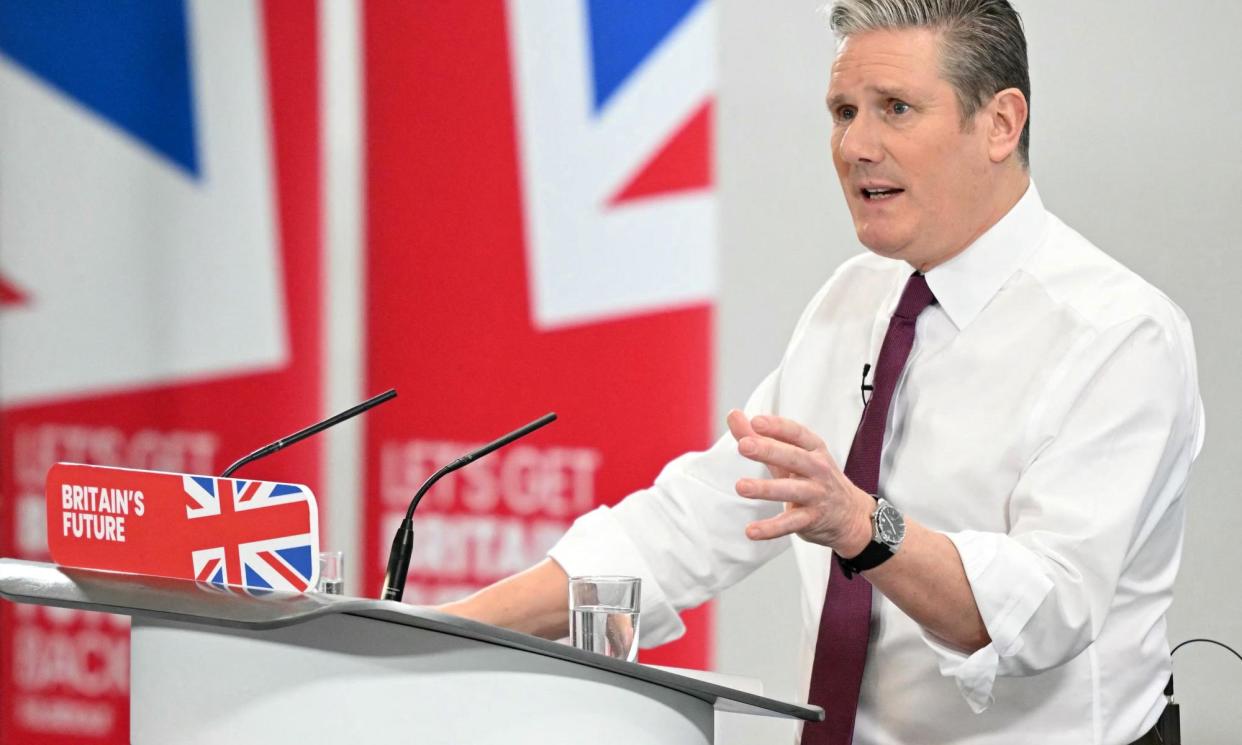Starmer rules out breaking Labour’s fiscal rules to meet £28bn green target

Keir Starmer has ruled out breaking Labour’s fiscal rules to meet its green investment targets if it wins the election this year, in the clearest sign yet that the party is willing to scale back one of its flagship policies in the face of Conservative attacks.
The Labour leader told an audience in Bristol on Thursday that he would not borrow £28bn to spend on green projects if it meant breaking a separate promise to reduce government debt as a proportion of economic output.
The £28bn policy has been at the centre of a tussle between senior Labour figures for months, with some wanting to drop it and others arguing it is an essential part of the party’s growth plan.
Related: Keir Starmer considers scaling back Labour’s £28bn green plans
Starmer said on Thursday that the £28bn promise was not sacrosanct, and that the party’s main green policy was instead to have zero-carbon power by 2030. “There is no question of pushing back on the mission – the mission is clean power by 2030,” he said.
But he added: “The money that is needed for the investment … will be subject to our fiscal rules. And that means that if the money is for borrowing … but the fiscal rules don’t allow it, then we will borrow less.”
The Labour leader was answering questions after a speech in Bristol to mark the beginning of election year. Starmer promised that Labour would restore optimism to a “downtrodden” country if it wins the election, adding: “We must crush that politics of divide and decline with a new ‘project hope’.”
A year ago, he and Rishi Sunak gave back-to-back speeches in which they made competing promises for how they intend to lead the country. While the prime minister has met only one of his five promises – halving inflation – Starmer has come under pressure in different ways.
As Labour officials rush to finish the party’s manifesto, previously announced policies are coming under increased scrutiny to make sure they can withstand the heat of an election campaign.
Chief among those is the party’s promise to spend £28bn on green investment projects, funded mainly by borrowing.
Several senior Labour officials, including Pat McFadden, the shadow Cabinet Office minister and Morgan McSweeney, the Labour campaign chief, want the plans to be scaled back in order to protect Labour’s reputation for fiscal prudence. Others believe doing so would add to criticisms that Starmer’s promises cannot be trusted.
Starmer clarified on Thursday that the party’s fiscal rules would come first. Nevertheless, party chiefs have not yet decided what to do if they cannot borrow enough to fund the green plans.
Labour could either decide to hit the target using spending from elsewhere or revenues from increased taxes, or it could decide to drop or delay the target altogether.
Starmer’s words suggest he is more committed to achieving clean power by 2030 than he is on spending the full £28bn. “Clean power by 2030 will mean lower bills, energy security, the next generation of jobs,” he said.
But his comments have angered some on the left who insist Labour’s green targets will not be met without proper investment.
Sharon Graham, the general secretary of the union Unite, said: “‘Project hope’ will require serious investment. Relying on growth to generate that investment is not realistic. We have not had significant growth since the 1970s. If we depend on growth to fund all the investment we need it will only result in inertia.
“Britain needs a Labour government,” she added. “But it needs it to be serious about real change.”
Meanwhile, Starmer appeared to damp down speculation that Labour could go into the next election promising cuts to either income tax or national insurance. The Labour leader said he did want to cut taxes in the long run, but wanted to return the country to economic growth first.
“I’m challenged on tax all of the time,” he said. “The first lever that we want to pull, the first place we will pull, is growth in our economy, because that’s what’s been missing for 14 years without growth. We won’t have the money to run our public services to provide what is desperately needed.”
He also clarified that while Labour was willing to process more asylum cases abroad, it wanted to do so before they arrived in Britain rather than afterwards as is being proposed as part of the government’s Rwanda plan.
“The Ukraine [asylum] scheme has an element of processing offshore before people arrive in this country – it can be done,” he said. “And I’m open to sensible suggestions and credible solutions to what is very obviously a problem.”
Starmer will embark on a three-month tour of the UK, hosting a series of question and answer sessions with voters primarily in medium-sized towns that the party is hoping to take from the Tories this year.

 Yahoo News
Yahoo News 
